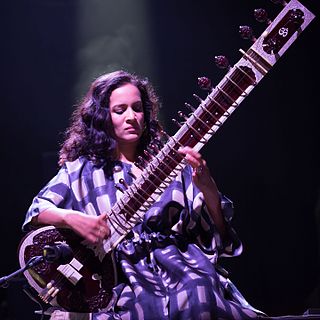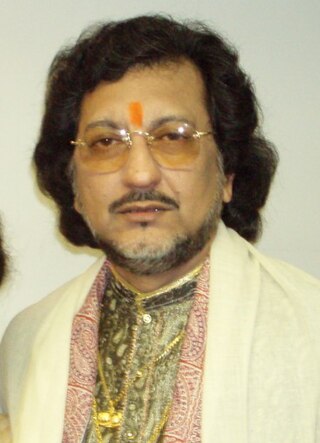This article needs additional citations for verification .(May 2009) |
Gopal Shankar Mishra (born 13 August 1957-1999) was an Indian musician and music teacher, who played the vichitra veena.
This article needs additional citations for verification .(May 2009) |
Gopal Shankar Mishra (born 13 August 1957-1999) was an Indian musician and music teacher, who played the vichitra veena.
Mishra was invited to join the 1998 UK touring and Real World recording project made by State of Bengal and Ananda Shankar, Uday Shankar's son. [1]
Gopal was born in Kanpur, India in 1957.[ citation needed ] His sister, Ragini, was born some years later. His mother was called Padma. Surrounded by and growing up with a naturally musical culture, his interest deepened following an international tour with his father. He had studied vocal music and sitar since the age of four and was interested in cricket and other sports.[ citation needed ]
At the age of 15 his interest in music turned serious. His father introduced him to the industry in 1975 at Varanasi. Chhotelal Mishra, disciple of Pandit Anokhelal Mishra accompanied Gopal who performed a rendering of Marwa, with Chandrakauns and Pahadi on the sitar.[ citation needed ]

Ravi Shankar was an Indian sitarist and composer. A sitar virtuoso, he became the world's best-known expert of North Indian classical music in the second half of the 20th century, and influenced many musicians in India and throughout the world. Shankar was awarded India's highest civilian honour, the Bharat Ratna, in 1999.

Ustad Allauddin Khan, also known as was an Indian sarod player and multi-instrumentalist, composer and one of the most notable music teachers of the 20th century in Indian classical music. For a generation many of his students, across different instruments like sitar and violin, dominated Hindustani classical and became one of the most famous exponents of the form ever, including Khan.

Anoushka Hemangini Shankar is a British-American sitar player and musician of Indian descent, as well as occasional writer. She performs across multiple genres and styles—classical and contemporary, acoustic and electronic. In addition to releasing seven solo studio albums beginning with Anoushka (1998), she has also worked alongside a wide variety of musicians, including Karsh Kale on the full-length collaboration Breathing Under Water (2007) and her father Ravi Shankar. She has received nine Grammy Awards nominations and was the first musician of Indian origin to perform live and to serve as a presenter at the ceremony. She was the youngest and first woman to receive a British House of Commons Shield.
Ananda Shankar was an Indian musician, singer, and composer best known for fusing Western and Eastern musical styles. He was married to dancer and choreographer Tanusree Shankar.
Shubhendra Shankar, also known as Shubho Shankar, was an Indian graphic artist, musician and composer. He was the only son of musicians Annapurna Devi and Ravi Shankar.

The vichitra veena is a stick zither, a plucked string instrument used in Hindustani music. Similar to the Carnatic gottuvadhyam it has no frets and is played with a slide.
Lalmani Misra was an Indian classical musician.
The history of the sitar in jazz, that is the fusion of the sounds of Indian classical music with Western jazz, dates back from the late-1950s or early-1960s when musicians trained in Indian classical music such as Ravi Shankar started collaborating with jazz musicians such as Tony Scott and Bud Shank. Later jazz recordings containing sitar music include albums by Miles Davis, Alice Coltrane, Yusef Lateef, Joe Harriott ,and Ornette Coleman.
Kartik Seshadri is an Indian sitar player and teacher of Indian classical music. He is the director of the Indian Classical Music Ensemble at the University of California, San Diego.

Pandit Shivnath Mishra is an Indian sitarist. He is an exponent of the Benares Gharana school of Indian classical music. He was formerly a lecturer and the Head of the Music Department at the Sampurnanand Sanskrit University, Varanasi.

Pandit Kumar Bose, born 4 April 1953, is an Indian tabla musician and composer of Indian classical music.
N. Rajam is an Indian violinist who performs Hindustani classical music. She remained professor of music at Banaras Hindu University, eventually became head of the department and the dean of the Faculty of Performing Arts of the university.

Full Circle: Carnegie Hall 2000 is a live album by Indian musician and composer Ravi Shankar, released in 2001 through the record label Angel Records. Recorded at Carnegie Hall in October 2000 as part of a tour with Shankar's daughter Anoushka, the album contains five tracks and presents two ragas. The concert occurred sixty-two years after Shankar's first performance at Carnegie Hall and commemorated his eightieth birthday; the album was his first live recording in nearly twenty years. Full Circle was produced by Hans Wendl, mastered by Scott Hull, and mixed and engineered by Tom Lazarus. Featured are performances by Tanmoy Bose and Bickram Ghosh on tabla, and Anoushka and Ravi on sitar.

Darshan Doshi is an Indian drummer and composer, who is currently touring with Salim–Sulaiman, Farhan Akhtar, Adnan Sami, Diljit Dosanjh and Amit Trivedi. He has played drums for several Bollywood films such as Rock On, Black, Dhoom 2, Bhaag Milkha Bhaag, Queen, Secret Superstar, Fitoor, and Dear Zindagi.

Ravi Shankar's Music Festival from India was an Indian classical music revue led by sitarist and composer Ravi Shankar intended for Western concert audiences and performed in 1974. Its presentation was the first project undertaken by the Material World Charitable Foundation, set up the previous year by ex-Beatle George Harrison. Long a champion of Indian music, Harrison also produced an eponymous studio album by the Music Festival orchestra, which was released in 1976 on his Dark Horse record label. Both the CD format of the Ravi Shankar's Music Festival from India album and a DVD of their performance at the Royal Albert Hall in London were issued for the first time on the 2010 Shankar–Harrison box set Collaborations.

Ragini Trivedi is an Indian classical musician performing on vichitra veena, sitar and jal tarang. Daughter of the vichitra veena player and musicologist Lalmani Misra, she is an exponent of Misrabani and is the creator of a digital music notation system called Ome Swarlipi.

Ananda Gopal Bandopadhyay was an Indian tabla player. He was trained in the style of the Benaras Gharana by his teacher Mahadev Prasad Mishra. His father, Radha Gopal Bandopadhyay, was an amateur vocalist. Bandopadhyay has accompanied several notable vocal musicians, as well as producing solo recordings, and giving solo performances.
Ratul Shankar is a percussionist and actor.

Pandit Manilal Nag is an Indian classical sitar player and an exponent of the Bishnupur gharana of Bengal. He was given the Padma Shri Award, the fourth highest civilian award in India in 2020.
1. Jacket note by Alan James, Out of Stillness Real World Compact Disc, April 2000